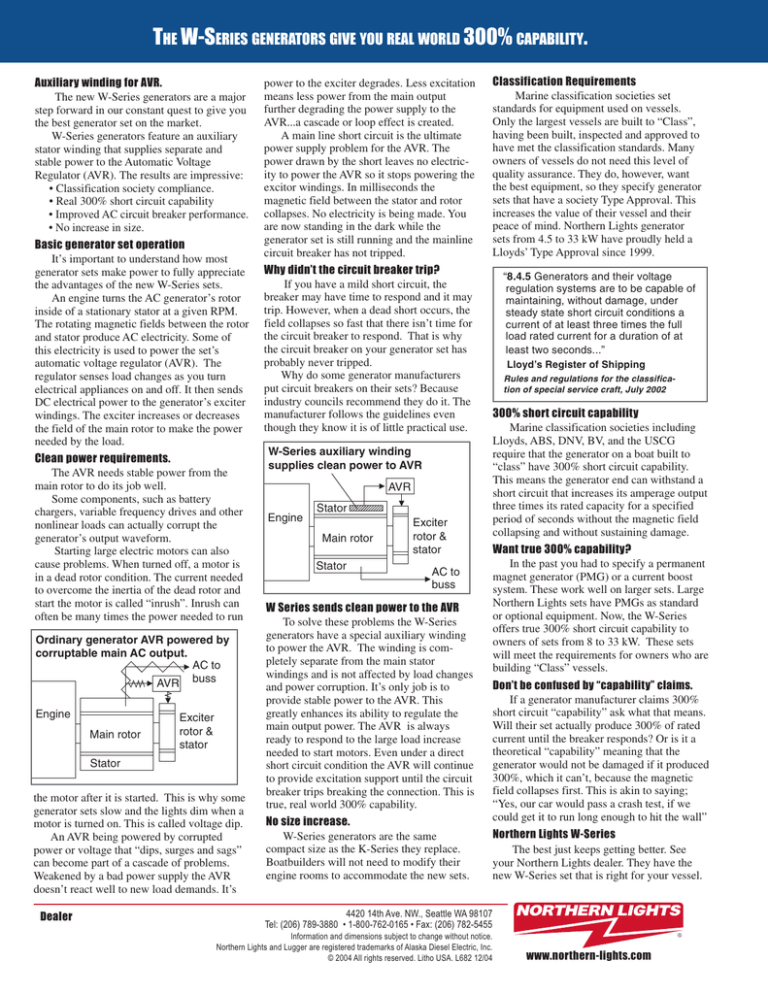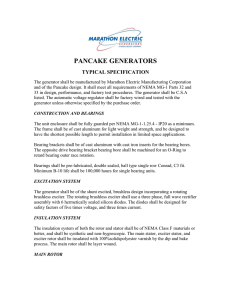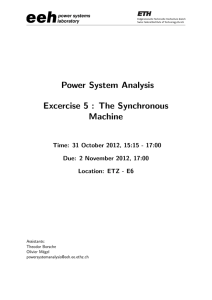
THE W-SERIES GENERATORS GIVE YOU REAL WORLD 300% CAPABILITY.
Auxiliary winding for AVR.
The new W-Series generators are a major
step forward in our constant quest to give you
the best generator set on the market.
W-Series generators feature an auxiliary
stator winding that supplies separate and
stable power to the Automatic Voltage
Regulator (AVR). The results are impressive:
• Classification society compliance.
• Real 300% short circuit capability
• Improved AC circuit breaker performance.
• No increase in size.
Basic generator set operation
It’s important to understand how most
generator sets make power to fully appreciate
the advantages of the new W-Series sets.
An engine turns the AC generator’s rotor
inside of a stationary stator at a given RPM.
The rotating magnetic fields between the rotor
and stator produce AC electricity. Some of
this electricity is used to power the set’s
automatic voltage regulator (AVR). The
regulator senses load changes as you turn
electrical appliances on and off. It then sends
DC electrical power to the generator’s exciter
windings. The exciter increases or decreases
the field of the main rotor to make the power
needed by the load.
Clean power requirements.
The AVR needs stable power from the
main rotor to do its job well.
Some components, such as battery
chargers, variable frequency drives and other
nonlinear loads can actually corrupt the
generator’s output waveform.
Starting large electric motors can also
cause problems. When turned off, a motor is
in a dead rotor condition. The current needed
to overcome the inertia of the dead rotor and
start the motor is called “inrush”. Inrush can
often be many times the power needed to run
Ordinary generator AVR powered by
corruptable main AC output.
AC to
AVR buss
Engine
Main rotor
Exciter
rotor &
stator
Stator
the motor after it is started. This is why some
generator sets slow and the lights dim when a
motor is turned on. This is called voltage dip.
An AVR being powered by corrupted
power or voltage that “dips, surges and sags”
can become part of a cascade of problems.
Weakened by a bad power supply the AVR
doesn’t react well to new load demands. It’s
Dealer
power to the exciter degrades. Less excitation
means less power from the main output
further degrading the power supply to the
AVR...a cascade or loop effect is created.
A main line short circuit is the ultimate
power supply problem for the AVR. The
power drawn by the short leaves no electricity to power the AVR so it stops powering the
excitor windings. In milliseconds the
magnetic field between the stator and rotor
collapses. No electricity is being made. You
are now standing in the dark while the
generator set is still running and the mainline
circuit breaker has not tripped.
Why didn’t the circuit breaker trip?
If you have a mild short circuit, the
breaker may have time to respond and it may
trip. However, when a dead short occurs, the
field collapses so fast that there isn’t time for
the circuit breaker to respond. That is why
the circuit breaker on your generator set has
probably never tripped.
Why do some generator manufacturers
put circuit breakers on their sets? Because
industry councils recommend they do it. The
manufacturer follows the guidelines even
though they know it is of little practical use.
W-Series auxiliary winding
supplies clean power to AVR
AVR
Engine
Stator
Main rotor
Stator
Exciter
rotor &
stator
AC to
buss
W Series sends clean power to the AVR
To solve these problems the W-Series
generators have a special auxiliary winding
to power the AVR. The winding is completely separate from the main stator
windings and is not affected by load changes
and power corruption. It’s only job is to
provide stable power to the AVR. This
greatly enhances its ability to regulate the
main output power. The AVR is always
ready to respond to the large load increase
needed to start motors. Even under a direct
short circuit condition the AVR will continue
to provide excitation support until the circuit
breaker trips breaking the connection. This is
true, real world 300% capability.
No size increase.
W-Series generators are the same
compact size as the K-Series they replace.
Boatbuilders will not need to modify their
engine rooms to accommodate the new sets.
Classification Requirements
Marine classification societies set
standards for equipment used on vessels.
Only the largest vessels are built to “Class”,
having been built, inspected and approved to
have met the classification standards. Many
owners of vessels do not need this level of
quality assurance. They do, however, want
the best equipment, so they specify generator
sets that have a society Type Approval. This
increases the value of their vessel and their
peace of mind. Northern Lights generator
sets from 4.5 to 33 kW have proudly held a
Lloyds’ Type Approval since 1999.
“8.4.5 Generators and their voltage
regulation systems are to be capable of
maintaining, without damage, under
steady state short circuit conditions a
current of at least three times the full
load rated current for a duration of at
least two seconds...”
Lloyd’s Register of Shipping
Rules and regulations for the classification of special service craft, July 2002
300% short circuit capability
Marine classification societies including
Lloyds, ABS, DNV, BV, and the USCG
require that the generator on a boat built to
“class” have 300% short circuit capability.
This means the generator end can withstand a
short circuit that increases its amperage output
three times its rated capacity for a specified
period of seconds without the magnetic field
collapsing and without sustaining damage.
Want true 300% capability?
In the past you had to specify a permanent
magnet generator (PMG) or a current boost
system. These work well on larger sets. Large
Northern Lights sets have PMGs as standard
or optional equipment. Now, the W-Series
offers true 300% short circuit capability to
owners of sets from 8 to 33 kW. These sets
will meet the requirements for owners who are
building “Class” vessels.
Don’t be confused by “capability” claims.
If a generator manufacturer claims 300%
short circuit “capability” ask what that means.
Will their set actually produce 300% of rated
current until the breaker responds? Or is it a
theoretical “capability” meaning that the
generator would not be damaged if it produced
300%, which it can’t, because the magnetic
field collapses first. This is akin to saying;
“Yes, our car would pass a crash test, if we
could get it to run long enough to hit the wall”
Northern Lights W-Series
The best just keeps getting better. See
your Northern Lights dealer. They have the
new W-Series set that is right for your vessel.
4420 14th Ave. NW., Seattle WA 98107
Tel: (206) 789-3880 • 1-800-762-0165 • Fax: (206) 782-5455
Information and dimensions subject to change without notice.
Northern Lights and Lugger are registered trademarks of Alaska Diesel Electric, Inc.
© 2004 All rights reserved. Litho USA. L682 12/04
www.northern-lights.com
W-Series
W
The new Northern Lights W-Series generators
First the K, Now the W.
The Skewed Stator.
In 1998 we introduced the K-Series
which increased generator performance
without increasing size. Six years of duty
have shown the K generators to be nearly
bullet proof. The new W-Series is based
on this proven design and is the next step
in the ongoing development of superior
generator ends from Northern Lights.
W-Series will be phased into production on all marine and industrial Northern
Lights, 60 and 50 Hz sets, 8 to 33 kW.
The stator is hand
wound by experienced
craftsmen. The winder’s
eyes are a constant
quality control check.
The skewed design
(angled grooves) makes
electricity with a clean, symmetrical wave
form that electrical equipment needs.
The stator is encased in a strong, rolled
steel generator frame which has machined
ends to mate with the cast iron bearing
housing and SAE housing adapter.
Auxiliary Winding To Power The AVR.
An auxiliary stator winding makes
dedicated power for the new DST-1002FAK automatic voltage regulator.
This gives you several advantages.
• Classification society compliance.
• Real 300% short circuit capability
• Improved AC breaker performance.
See the back of this page for a detailed
explanation of this feature.
Automatic Voltage Regulator = 1% RMS.
The solid state AVR produces clean
1% RMS voltage regulation from no
load to full load. This protects electronics
and extends motor life. Compare this to
±
1.5% or ±5% of competitive generators.
The AVR also allows the generator to
produce 50 or 60 hertz power at 100 or
200 class voltage. Boatbuilders: you use
one set for domestic and foreign markets.
±
Hot Dripped
Rotor.
The rotor
is made up of
a shaft, large
sealed
bearing (A),
an easily
A
B
C
D
accessible
rotating rectifier (B), a large diameter
exciter rotor (C) and main rotor (D). The
rotor assembly is slowly hot dripped with
high quality, Class “H” epoxy insulation for
protection against the marine environment.
1 Phase Standard – 3 Optional.
Standard PX-300W generators are
1 phase, 4 wire. If you need 3 phase
power, order your set with an optional
12 wire generator end.
Bearing Housing & Exciter Stator.
The bearing housing is cast iron, not
aluminum. Iron is
stronger, resists
electrolysis and
has a thermal
expansion rate
that more closely
matches the
bearing on the
rotor. This helps
to prevent “spun bearing” failures that
plague aluminum housings.
We bolt the exciter stator in the removable bearing housing for easy access.
Some generators have the exciter welded
to the frame making it unreplaceable.
The Leader Uses Leads.
Some manufacturers use the solid
copper magnet wire to connect the set to
the load. “Leadless” design is cheaper but
prone to failure from vibration. We use
multi-strand wire leads with high temperature insulation. These leads go to a
terminal strip in the junction box for easy
connection to your AC electrical system.
Paralleling the big boys.
The M844LW2, M864W and M984W
models have 2/3 winding pitch so they
can be easily paralleled with the larger
Northern Lights sets. This makes them
part of your total power solution.
A look inside the PX-300W generators from 8 to 33 kW.
High Copper Content.
One thing we didn’t change was the
amount of copper in the generator. High
copper content gives higher performance.
• Better generator efficiency.
• More motor starting capability.
• Longer life. The PX-300Ws have a
conservative 95°C temperature rise rating
at 50°C ambient air. Compare this to the
105/40 or even 125/50 ratings used by
some manufacturers.
Generators
1.
2.
3.
4.
5.
6.
7.
Cast iron bearing housing.
Junction box with vibration isolation mounts.
2 amp AVR AC circuit breaker.
Circuit breaker for engine’s DC system.
Cast iron SAE housing.
Large diameter exciter rotor.
Large diameter main rotor.
4
2
3
8. Cooling fan.
9. SAE, cast iron drive ring.
10. Hand wound skewed stator with auxiliary
AVR power winding.
11. Rolled steel generator frame.
12. Exciter stator bolts into bearing housing.
13. Bearing carrier.
14. Mounting foot.
Mounted in junction box (No 2) and not shown;
Multi-strand generator leads.
Engine DC system relays.
AVR junction block.
DST-100-2-FAK automatic voltage regulator.
1
5
13 12
14
11
10
6
7
8
9


